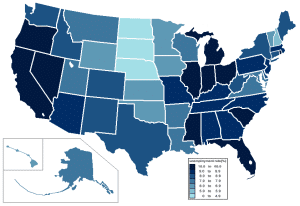 The impact of the U.S. economic crisis has been geographically uneven (see map). You can’t miss it in Las Vegas, where there are half-constructed homes, ubiquitous “For Sale” signs, abandoned shopping plazas, and homeless and half-crazed men and women, in sharp contrast to the scene there a few years ago. But in Boulder, Colorado you would be hard-pressed to find such evidence. Housing prices have not collapsed; rents are astronomical; tourists abound; bars and restaurants are crowded; and the unemployment rate is low. There are problems. Small retail shops have closed; there is an inordinate number of sole proprietors (which could be a sign of inadequate decently-waged employment); there are many homeless persons; and much of the grunt work is done by Latinos who can’t afford to live in Boulder or, if they do, live in substandard housing. Yet, these same features have probably marked Boulder for years, predating the economic downturn. There has been a significant increase in people seeking food assistance in Boulder County, but this includes a much wider area than the city proper.
The impact of the U.S. economic crisis has been geographically uneven (see map). You can’t miss it in Las Vegas, where there are half-constructed homes, ubiquitous “For Sale” signs, abandoned shopping plazas, and homeless and half-crazed men and women, in sharp contrast to the scene there a few years ago. But in Boulder, Colorado you would be hard-pressed to find such evidence. Housing prices have not collapsed; rents are astronomical; tourists abound; bars and restaurants are crowded; and the unemployment rate is low. There are problems. Small retail shops have closed; there is an inordinate number of sole proprietors (which could be a sign of inadequate decently-waged employment); there are many homeless persons; and much of the grunt work is done by Latinos who can’t afford to live in Boulder or, if they do, live in substandard housing. Yet, these same features have probably marked Boulder for years, predating the economic downturn. There has been a significant increase in people seeking food assistance in Boulder County, but this includes a much wider area than the city proper.
In most places, the data and stories in the local newspapers and on radio and television tell us that there is plenty of economic distress. We know from research studies that rising unemployment and inequality have deleterious effects on mental and physical health—depression, hypertension, cardiovascular disease, cirrhosis of the liver, suicides—and are correlated with family problems, arrests, prison admissions, poor school quality, increases in admissions to mental hospitals, and many others. The official unemployment rate rose from 4.6 percent in 2006 to 9.3 percent in 2009; it was 9.5 percent in July of this year. If we count those who have dropped out of the labor force and those working part-time involuntarily, the national (expanded) unemployment rate skyrockets to 16.5 percent. Among Black and Hispanic persons, the unemployment rate is much higher, 15.6 and 12.1 percent respectively in July; the expanded rates for each group are well in excess of 20 percent. The inequality of both income and wealth are higher than at any time since the late 1920s and have been rising since the mid-1970s.
But if we know what is happening, finding personal evidence isn’t as easy as it would have been in 1933, when you could see the “Hoovervilles” on the outskirts of towns, witness the mass migration of dust bowl-driven sharecroppers from the Midwest to California, see the breadlines, or participate in a collective standoff with sheriffs trying to evict a family. Today, the miseries created by economic crisis don’t show themselves so obviously. A family loses its home and goes to live somewhere else. The members of the household may face all sorts of traumas, but we don’t see these. A longtime employee loses her job, but she just goes home and searches for another one. If she loses her health insurance and gets sick, she finds some kind of treatment or just stays ill. Mexican immigrants are fired after a raid by ICE officers, but they simply languish in jail or are deported. Their kids are sucked into the maws of the social service agencies. An old man’s retirement income is cut, but he just finds his way to the nearest WalMart and gets a job greeting people at the door.
Where there are no mass movements to speak for the afflicted, their plights are individual, and unless you seek them out or keep your eyes and ears wide open and close to the ground, you won’t see or hear them, except in the sensational cases that make the news: the fired worker who returns to his place of employment and opens fire; someone facing bankruptcy commits suicide or kills his family; a young Mexican immigrant robs a bank to help support his family; an employee beset by debt embezzles money. Again, all individual responses to individual crises.
We have been traveling up, down, and around the United States for more than nine years, and here are some of things we saw and heard during our recent six-month trip that I think show the stress caused by a failing economy, things we hadn’t seen or heard before and which a casual observer might miss:
*panhandlers in places you might not expect. On the flower-lined main street of the coastal Oregon town of Florence, we saw obviously destitute men sitting on the sidewalk among the tourists, with signs asking for money. We’ve been visiting Florence since 2003 and never seen this.
*hidden poverty showing its face. In the upscale town of Healdsburg, California, we saw a long line, snaking around the block, of mostly brown-skinned men, women, and children at a food bank. On the main streets, with their restored buildings and inviting shops, we saw only white people. In Casper, Wyoming, a town with a fairly low unemployment rate and overwhelmingly white, a similar line waited for a Goodwill store to open.
*travelers with nice cars and, as we could tell from talking to some of them, above average incomes, staying at cheap motels and hostels. We met hostellers who were attending professional meetings and classes but staying in hostels to save money. In Estes Park, the cheapest motel in town was busier than we had ever seen it. In Las Vegas and Reno, hotels are practically giving rooms away, so slow is business. In Reno, we got a room for $49, with two more nights free and about $50 in restaurant coupons. The room was larger than our New York City apartment and had two bathrooms.
*businesses with storied histories closing their doors. The Macy’s in Missoula, Montana, which takes up an entire block, sits empty. Dan’s Western Wear, a fixture in Sheridan, Wyoming for ninety years, will shut its doors when its inventory is gone. Empty storefronts abound in every small town we visited. In cities such as Las Vegas, entire shopping malls are vacant. A large housewares retailer on trendy 23rd Avenue in Portland has cut its operations to four days a week. No business seems immune to suddenly ceasing to operate.
*extraordinarily deep discounts in house and condominium prices. We saw a condo building in Las Vegas offering a 60 percent price reduction. Prices have fallen dramatically in the green and desirable Civano development in which we lived in Tucson just two years ago. A brochure in Portland advertises remarkable price reductions (click on brochure). 
*strangers offering tales of troubles and acting out in public. A woman in a hostel tells me she has just lost her job at PBS. Motel room attendants tell us that they have to clean more than twenty-five rooms a day. Others say they can’t sell their houses; several now carry two mortgages because they moved and can’t sell their old residence. Innkeepers bemoan the lack of customers. A young couple on a park bench in Portland are both unemployed but thankful that the farmer’s market accepts food stamps. A young woman wants to rent a motel room for a month in Buffalo, Wyoming; she has no other place to live. We have, for the first time, seen people openly crying on town and city streets. Others shout and scream at one another, oblivious to their surroundings. Too many people walk with “their heads bowed down.” I don’t like to tell anyone anymore that I retired at age fifty-five. Not many people with whom we have spoken can imagine doing that.
*public facilities are deteriorating. Streets are dirtier. Roads are falling apart. Public offices aren’t open every day; in Grass Valley, California, city hall is closed on Friday. The Las Vegas Museum of Art is closed every day. The street lights have gone out in Colorado Springs. Whatever public property and services towns can sell, they are— to private operators and contractors.
In the face of all this, those hurting the most are left with little choice but to rely on family or friends and whatever charities and public aid they can find. Unfortunately, many charities are themselves struggling to find money; in Tucson a charity couldn’t raise money to buy Christmas toys for poor kids. Governments at every level have either radically reduced social welfare spending or made it clear that they are going to do so soon. There is no doubt that the federal government’s economic recovery efforts helped avert a national economic catastrophe. However, not nearly enough money found its way into the pockets of the working class, nor did it translate into bountiful employment. Some jobs were saved, but few new ones were created. The only overt sign of public employment spending is highway construction, where signs of federal largesse abound (see photo). 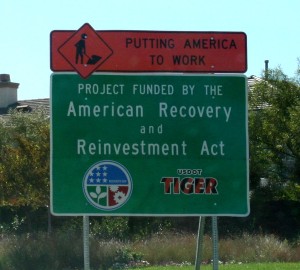 We have seen these on scores of roads. The only trouble is that we saw lots of machines but not many workers. On a long stretch of Interstate 90 in Western Montana, we kept being forced into one lane by construction barrels. We didn’t lay eyes on a single worker. What is more, the money the government has spent, on highways and nearly everything else, has gone to private sector business firms. Public works projects like those so common during the Great Depression (whose benefits are still being enjoyed by the public) are nowhere to be found.
We have seen these on scores of roads. The only trouble is that we saw lots of machines but not many workers. On a long stretch of Interstate 90 in Western Montana, we kept being forced into one lane by construction barrels. We didn’t lay eyes on a single worker. What is more, the money the government has spent, on highways and nearly everything else, has gone to private sector business firms. Public works projects like those so common during the Great Depression (whose benefits are still being enjoyed by the public) are nowhere to be found.
The ethic of the government’s recovery program is one in which the working class is seen partly as a victim and partly to blame for its own sorry state. Enough help will be given to keep people from exploding but not so much that ordinary folks might begin to think that they have rights. The bankers and the great Wall Street capitalists have rights; the rest of us have to fend for ourselves. At the beginning of the last post, there is a photo of a sign in the window of a Portland dry-cleaner. It reads: “If you are unemployed and need an outfit cleaned for an interview, we will clean it for FREE.” Note the word “need.” Human beings have needs: for food, shelter, clothing, healthcare, comfort in old age, and many more. It should be the duty of a society to do the best it can to see to it that these needs are met. The greedy, swinish lords of finance have enough money to meet their needs and then some. Yet President Obama has seen fit to shower still more money upon them, while pretty much ignoring the basic needs of the people. Now his popularity is swooning, while the rich are turning against him because he wants to put in place extremely mild constraints on their “right” to steal our money. I wonder if he ever thinks that he would have been in a lot stronger position now if he had worried less about those at the top of the heap amd more about the needs of those who produce the nation’s goods and services.



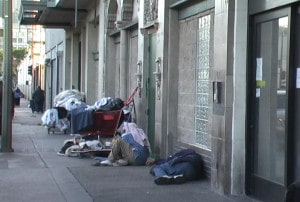

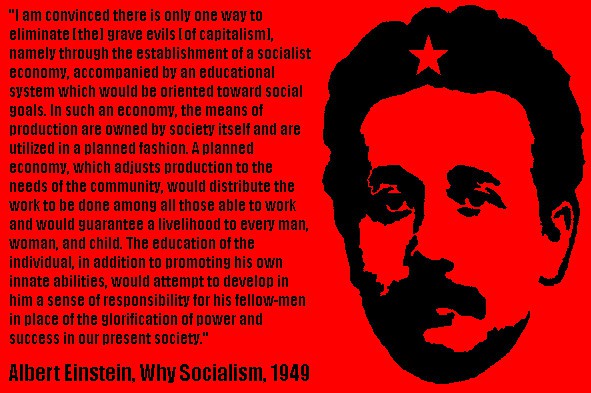
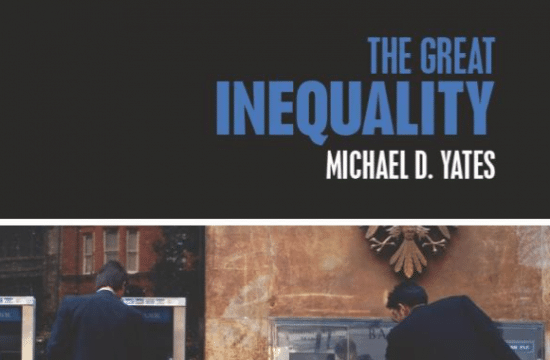




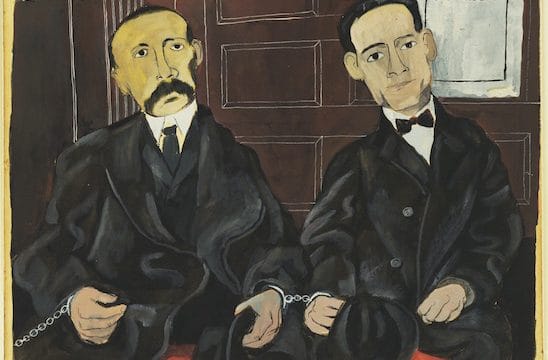
I agree with you. I heard you on Dog Henwood`s radio show. People are ruder as well as heavier. I take a chance every time I ride my bike in the angry traffic!
Thanks, Kevin.
What`s wrong with this scene?
people are organizing and fighting back. look up the Take Back The Land movement.
Look up the Student Occupation movement in California and beyond. my school just had a near-riot over budget cuts: http://occupyla.wordpress.com
the movements are not that big yet, but i suspect with the GOP regaining control in congress in november, they will start to explode.
remember, it took like 3 years after the 1929 crash to see large workers movements emerge. we are building up, things are about to explode. everyone knows it. everyone can feel it.
this situation can’t go on. it’s true we are more alienated and atomized and isolated today, but i think we will break down those barriers when we have to.
eek, I hope you are right. I especially hope that young people come to see this system for the shell game it is and rebel against it.
Thanks Mike, just want to make a special note to readers to be sure to check the hyperlinks, very critical data found there. 🙂
Nice work. I too just heard you on Henwood’s show. People are gradually beginning to freak out it will build up slowly and then take off. My guess is that we will see an explosion starting probably in the spring of next year unless, miraculously, things turn around significantly. The MSM is offering us nothing but lies and more and more people are beginning to realize that fact–unfortunately nearly everyone has no frame-of-reference to see an alternative view so they move into fantasies and delusions often directed by PR pros who know exactly what to say and do to manipulate people into whatever the highest bidder wants. Fortunately for us these forces are all going in different directions making people very craaaazy.
eek, I hope you are right. When I was young we took to the streets and were willing to take the consequences–I don’t see young people doing that yet. I hope it comes–I don’t have the energy at my age to do much but if y’all hit the streets I’ll dust off the kerchief and do whatever is necessary.
Yeah, I heard Michael Yates on Doug Henwood’s show too. And I can totally see why the power walker was disturbed by people getting in his way. They were probably interrupting his internal monologue of passive/aggressively scapegoating all the “300/400/500 pound people”.
Ooops, was that a mirror I just held up? Soooo sorry! 😛
Avery, Thanks for your comments. People in the US keep gaining weight. It is interesting to ask why. I wll be posting about this soon.
Anyone familiar with what I write knows that I don’t scapegoat anybody. The responsibilty here is with the subsidization of unhealthy products,
poor education, substandard pay, unavailability of good and reasonably priced food in poor neighborhoods and many other places, unsavory food indsutry practices,
fast food lobbying, horrible or no health care, etc. I don’t think it is a good thing for people to be obese. Or smoke, Or drink and use drugs to excess. Do you?
Is this scapegoating? I doubt it.
Mike, just writing to let you know you have gained a new fan. I like your reporting and interpretation of events on the ground. It is refreshing in the face of the relentless pooh-bah that the MSM passes off as news and commentary, including papers such as the NY Times and “news” magazines like Time and Newsweek.
I am very much looking forward to future posts, especially about diet in 21st century America.
Mike said:
“People in the US keep gaining weight. It is interesting to ask why. I wll be posting about this soon.”
I’m pretty sure someone, maybe Doug or Kelley, posted something about a correlation between obesity and low income over at LBO-Talk (no time now to search for it, I’m afraid; maybe later).
There is indeed much to write about how fat people are viewed in society. It is, to state it with a little humor, a subject which covers a lo of ground if one takes a look at everything in play.
For one thing, it should be recalled that cigarettes and many drugs have been explicitly advertised as weight loss devices. Women especially, but to a degree men as well, have been propagandized to believe that some very dangerous measures are worth it not to be fat.
The most modern iteration of this has been a series of television programs I have nicknamed “Bataan Death March for Fatties” (Fat March), “Abu Ghraib for Fatties” (The Biggest Loser), and “Gitmo for Fatties” (Fit Club Boot Camp). It is not difficult to see the official sanction of tortuous and militaristic practices we are to accept as the proper way to deal with the adipose. To say nothing of the rising popularity of gastrodisruptive surgeries which have crippled and killed a number of people I know.
Much of the rationale for all this is the framing of how much their health care will cost “the rest of us”, a haunting construct given that the rest of us are supposedly now in the minority. It has also been noted that the federal government’s task force on obesity has no adipose people on it. Since when does a minority dictate to a majority so absolutely? Oh yes, I believe we all know a Dutch word for that. I am sorry to say this thinking often seems to infect the thinking of factions who should know better, producing calls in to KPFA along the lines of disgust at seeing “those overweight, coke drinking people at the peace march”. Why? Do you have to be thin to be a proper revolutionary? I can tell you of my I’ve met who would be happy to say otherwise, including a member of the Council on Size and Weight Discrimination named Lynn McAfee who regularly sees to it that the FDA does its due diligence to prevent another case like that of phen-fen which turned some people’s heart valves to jelly, and dexfenfluramine which was found to increase the risk of primary pulmonary hypertension, and was suspended over the objection of one weight loss enthusiast in industry who opined that those FDA panelists who reject this drug “should be shot”.
Now you ask if believe that fat people can be healthy. My answer is in many cases they can be a lot healthier than they are, and that they do not need to turn themselves into thin people to do it. That is the contention of a dissident paradigm in the medical and fitness fields called Health At Every Size, which combines much of what you note about better food with exercise appropriate for their body type (and not forcing them to do exercise optimized for thin bodies, which for fat people can be injurious), as well as promotion of the activist spirit to confront discriminatory policy and tactics of others.
Avery is obviously a member of the fat acceptance movement. They believe that there is nothing wrong with a person being as obese as they may be, and as such obesity should not be viewed as abnormal or troubling, no matter what its extent. They think the health problems associated with obesity have been greatly exaggerated, and many deny that there is an obesity epidemic going on now in the US. They also hold that most obese people are just born to be fat, in some cases very fat, and trying to lose their fat is almost impossible (“Ninety-five percent of diets don’t work”).
I would call this an extreme position. But I also think he’s got a point in many of the statements he makes. It is also extreme, and wrong, to pressure people, especially women, to be uniformly, *unrealistically* thin. Being too thin is a health hazard also. But the fact is, MOST adults in the US are presently overweight to some extent, and within the past few years there has been a great proliferation of obesity and super-obesity, especially in children. In the great majority of cases this is not about genes, it’s about cheap, readily-available unhealthy food, the role food plays in people’s lives, and the lifestyle choices people make, which are driven by much larger forces in society. It is not true that people can’t lose fat and keep it off, people do it every day, and they do it not because they’re *on a diet* but because they’ve changed the way they live. This is not an easy thing to do. Being obese does appear to have health risks associated with it. BTW, it’s been proposed that part of the Great American Weight Gain has been a result of so many of us kicking the nicotine habit…smoking does indeed curb appetite. But it’s much healthier to have to deal with a few more pounds than the cancer sticks.
Mike is correct. USers are fatter overall and there are many more of us who are seriously overweight, especially kids, and this has happened in a relatively short period of time. Like him I think this epidemic is to an extent a symptom of societal problems.
Well a few things….
“No matter what its extent” is a phrase which seems to me, as does the casual lumping of “300/400/500” pound people, to go to the imagery that makes out that everyone who finds his or herself at a weight classified as “morbidly obese” has the mobility and health profile of the guy who shows up all sensationalized on TV being taken out by forklift through a sawed-out hole in a wall. Such cases are sensational precisely because, even now and here, even among the fat population they are rare. Yes I have been in fat-acceptance for over half my life now (and am one of the thinnest people I know by the way), and yeah, when I go to conventions, some people use scooters to go long distances around what are often pretty sizeable hotels, but the majority of the fat people I see attending these things are walking on their own feet.
Also, as to whether being very heavy is right or wrong, it gets complex when, for instance, one talks with a great number of people who are at these high weights and notes the frequency with which one hears stories like, “I look back at pictures when I was young and thought I was enormous. I really wasn’t, but was told I was, or told myself I was, and tried all manner of things to get thin, and gained back and rebounded, and was consumed in self-loathing, and hid at home, and never thought I deserved a date or a roll in the hay or really anything pleasant at all…. I would have been only moderately fat and a lot healthier had I just done what everyone told me was the worst thing ever, to LET MYSELF GO.”
There is a contention that, as with the rest of the critique of “manufacturing illness”, that some suspicion is due for statistics out of studies funded by organizations which themselves have many members or delegates from weight reduction related commerce. I take another tack, which is that I think it is not necessary at all to dispute the main thrust of these statistics, that fat people are quite often suffering maladies. My question is how much these are inherent to their fatness, and how much, to tie in to Mike’s references to the people’s meanness, to overt manifestations of hatred, bullying, other influences which impose emotional stress, all of which are more recently being turned up themselves as elevators of risk for many of the exact maladies associated with fatness.
I had to chortle a little when Amy Goodman today referred to Moustafa Bayoumi’s book, “What Does it Feel Like to Be a Problem”. That’s exactly it for fat people as well I think. If the idea is that there are structural problems in society and culture and economy which are making people unhealthy, then why do some people feel the necessity to make the existence of fat people into a marker for this. Imagine for a moment a really truly well-meaning person approaching you with, “You’re a walking indicator of the decline and fall of Western civilization… but it’s OK, we know it’s not your fault.”
Thank you for paying attention, I am one of the people that you write about.
I live on $667.00 a month that SSDI pays me because I have an autoimmune degenerative disease. I feel the judgement of people on my back everyday. I feel as though I am an obese woman that is criticized every time I eat a meal. I am of average size but I have an invisible sign on my back that says “wretched poor” As though its always my fault that I am down on my luck. I should “get a job” and although I am willing to work, there is very little I can do. It’s difficult to keep off the pity pot but I keep a positive attitude and carry on….